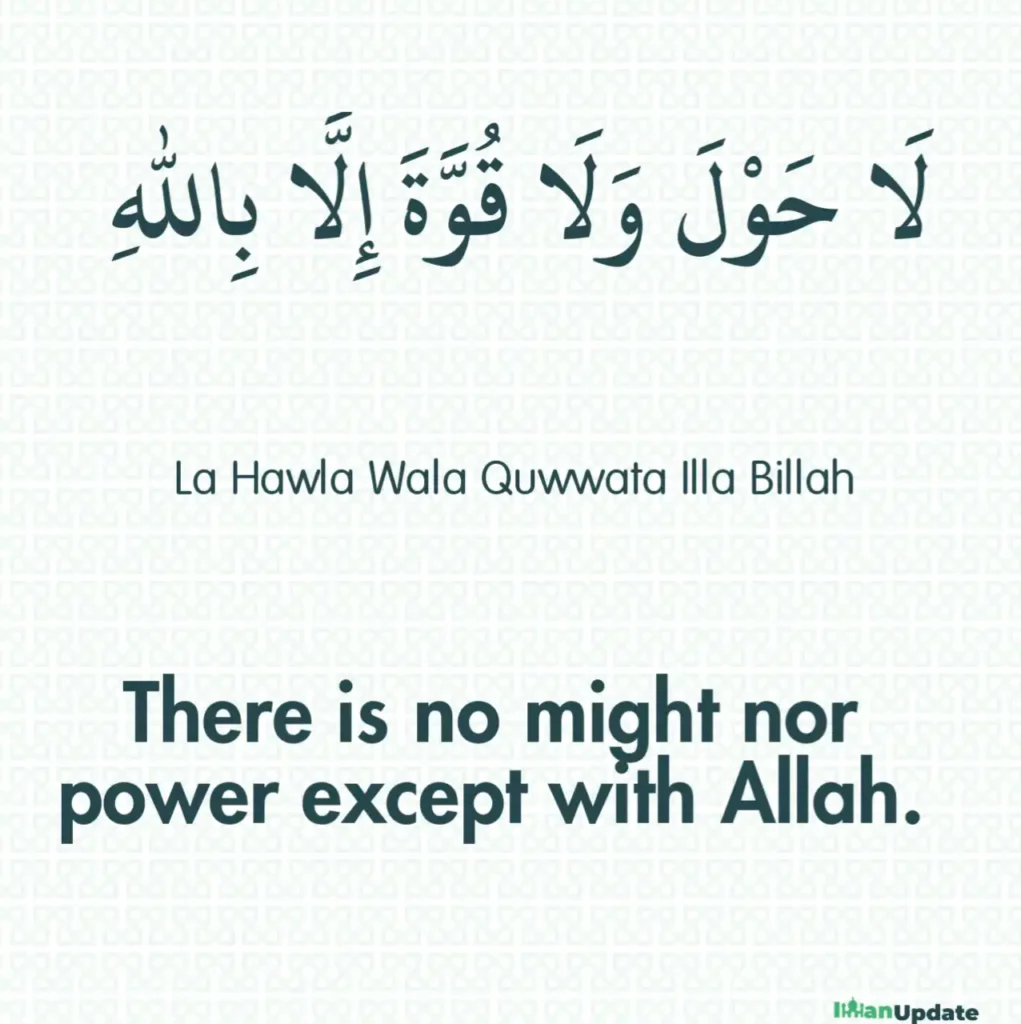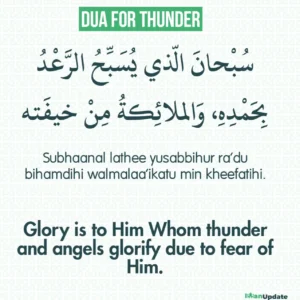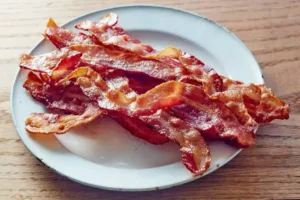La Hawla Wala Quwwata Illa Billah, Arabic Text, Hadith & Benefits

‘La Hawla Wala Quwwata Illa Billah’ is powerful zikr backed by multiple authentic Hadiths, offering a wealth of spiritual and worldly benefits.
Its versatile meaning makes it a valuable asset for believers, providing strength, guidance, and protection in all aspects of life.
La Hawla Wala Quwwata Illa Billah Meaning in English
La Hawla Wala Quwwata means There is no might nor power except with Allah.
La Hawla Wala Quwwata Illa Billah in Arabic
The zikr is written in Arabic as:
لَا حَوْلَ وَلَا قُوَّةَ إِلَّا بِاللهِ
The zikr may be translated word-by-word as:
- La = no, not, none, neither
- Hawla = change, motion, alteration, movement transformation.
- Wa = and La = no, neither, none, not.
- Quwwata = force, strength, potency, power, might, vigour
- Illa = if not, but, except, if not
- Bi = to, in, by means of, with, for, through.
- Allah = Arabic name for the Supreme Being
Here are several literal translations of the zikr that reflect the idea of change and transformation:
- There is neither change nor power except by means of Allah.
- There is no transformation or strength except through Allah.
- There is neither progress nor might except through Allah.
Transformation is the key to progress, and spiritual growth requires the most profound change. While we may desire transformation, we are powerless to achieve it alone.
Only through Allah’s mighty transformation (tahwil) can true change occur. When faced with tragedy, oppression, or helpless situations, a Muslim can turn to Allah, seeking strength and transformation through this powerful expression: ‘Laa Hawla Wala Quwwata Illa Billah’ (There is no might and no power but in Allah).”
La Hawla Wala Quwwata Illa Billahil Aliyyil Azeem in Arabic
This statement is written in Arabic as:
لَا حَوْلَ وَلَا قُوَّةَ إِلَّا بِٱللَّٰهِ ٱلْعَلِيِّ ٱلْعَظِيمِ
Laa Hawla Wala Quwwata Illa Billahil Aliyyil Azim Meaning
Laa hawla wala quwwata illa billahil aliyyil azeem means There is no power nor strength except by Allah the Lofty, the Great.

Laa Hawwla Wala Quwwata Illa Billah” is a powerful statement that embodies submission, trust, and reverence for Allah.
It acknowledges that no change or strength is possible without Allah’s will, and that He is the sole source of power and guidance.
This phrase is a treasure of Paradise because it recognizes Allah’s sovereignty and our dependence on Him.
It’s not just a statement of resignation but a declaration of seeking assistance and guidance. When overwhelmed, say “Laa hawwla walaa quwwata illaa billaah” and Allah will aid you.
This phrase is a call for help, unlike “Innaa lillaahi wa innaa ilayhi raaji’oon” which is a statement of resignation. Recite “Laa hawla walaa quwwata illa billaah” to seek Allah’s assistance and guidance in times of need.
Text of the Hadith
Abdullah Ibn Qays (may Allah be pleased with him) related that the Prophet (ﷺ) said to him, “O Abdullah Ibn Qays, shall I not inform you of a treasure from the treasures of paradise?” He (ﷺ) then said, “Say, La Hawla Wala Quwwata Illla Billah.
[Bukhari No# 4205, 6384, 6409, 7386; Muslim No# 2704; Abu Dawud No# 1526; At-Tirmidhi No# 3601; Ibn Majah No# 3824, 3825]
La Hawla Wala Quwwata Illa Billah Benefits
This treasured phrase, said by Prophet Muhammad (SAW), offers numerous benefits:
- Admits our powerlessness, acknowledging Allah as the sole source of strength
- Seeks Allah’s help in times of need, making affairs easier
- Recognizes our dependence on Allah, accepting His guidance and support
- Helps change circumstances, from hardship to ease, sickness to health, and more
- Overcomes laziness, strengthening our worship
- Reminds us that all might and strength come from Allah alone, humbling our pride
Recite it to tap into its transformative power and connect with Allah’s limitless strength!”
La Hawla Wala Quwwata Illa Billah In The Quran
Laa Hawla Wala Quwwata Illa Billah is found in Surah Kahf verse 39 of Chapter 18 of the Qur’an.
Allah says:
وَلَوۡلَآ إِذۡ دَخَلۡتَ جَنَّتَكَ قُلۡتَ مَا شَآءَ ٱللَّهُ لَا قُوَّةَ إِلَّا بِٱللَّهِۚ إِن تَرَنِ أَنَا۠ أَقَلَّ مِنكَ مَالًا وَوَلَدًا
Allah, the Most High – mentioned the story of the owner of two gardens in Surat Al-Kahf His companion said to him:
“It was better for you to say, when you entered your garden: “That which Allah wills (will come to pass)! There is no power but with Allah,” (Surah Al-Kahf: 39)
It would have been better for you and your garden would have lasted. But he entered it and said:
“I think not that this will ever perish. And I think not the Hour will ever come.” (Surah Al-Kahf: 35,36).
He was astonished by it and detested the establishment of the Hour. So Allah sent a torment from the sky on it and it became a slippery earth.
According to one of the Salaf, let whomever is pleased with something about his situation, fortune, or children say, la Hawla Wala Quwwata Illa Billah.
When to Say La hawla wa la quwwata illa Billah?
You say La hawla wa la quwwata illa Billah when you are confronted with a terrible situation that you are unable to handle, or when you are confronted with something that is really difficult to deal with.
Here are some of the places and times when this incredible supplication is said:
- When turning over at night
According to Ubadah ibn alSamit, the Prophet Muhammad (peace and blessings of Allah be upon him) said: Whoever wakes up in the night and says,
“La ilaha ill Allah, wahdahu la sharika lah, lahul mulk wa lahul hamd wa huwa ala kulli shay’een qadeer,” is a kulli shay’een qadeer. Alhamdulillah wa subhaan Allah wa la ilaha illAllah wa Allahu akbar, wa La hawla wa la quwwata illa Billah.
English translation: There is no other god than Allah Alone, with no co-religionists or associates. Praise and sovereignty belong to Him, and He is capable of accomplishing everything. There is no god but Allah, and Allah is the Most Great. Praise be to Allah, glory be to Allah, there is no god but Allah, and Allah is the Most Great. Except for Allah, there is no power or might.
Then you say, Allahumma ighfir li (O Allah, forgive me), or you make dua, your prayer will be answered. Your salah will be accepted if you perform wudu and pray. Reference Bukhari 1086
2. When the muazeen says “Hayya alas salaah (come to prayer)” or “Hayya alal falah (come to success)”.
After adhan and during the call to prayer, the prophet Muhammad SAW taught us what to say.
According to Hafs ibn Asim ibn Umar ibn alKhattab, his grandfather Umar ibn alKhattab stated to his father:
When the muazeen says, Hayya alas salah (come to prayer), and you say,
Laa hawla wa la quwwata illa Billah; after that, he says, Hayya alal falah (come to success), and you say, Laa hawla wa la quwwata illa Billah; after that, he says, Hayya alal falah (come to success), and you say, Laa Hawla Wala Quwwata Illa Billah.
3. When you are about to leave the house
Another time to say this sentence is while you are leaving the house. According to Anas ibn Malik, Allah’s Messenger (peace and blessings be upon him) said: Whoever says, that is, while he is leaving his residence.
Bismillah, tawwakaltu ala Allah, La hawla wa la quwwata illa Billah (In the name of Allah, I put my trust in Allah, and there is no power and no strength except with Allah).
It will be said to him, “You will be looked after and safeguarded, “and the Shaytan will leave him alone.”
Abu Dawood also mentions it in his Sunan, where he adds: ‘What can you do with a man who has been guided, cared for, and protected?’ Another shaytan will said this to him.
4. After praying (Fard)
Another chance to memorise and repeat this wonderful statement is after praying Fard (obligatory prayers).
This phrase, along with others, was said by Allah’s Messenger (peace and blessings of Allah be upon him) immediately after each Salam prayer.

Secret Of La Hawla Wala Quwwata Illa Billah
- One of the Treasures of Paradise
The prophet SAW explained the virtues of this lovely sentence to his companions. According to Abu Dhar’s narration of a Hadith, the Messenger (salallahu alayhi wa sallam) told him:
“Should I not lead you to a treasure from Paradise’s treasures?” “Yes, O Messenger of Allah,” Abu Dhar said. He said: la Hawla…. That is, but for Allah, there is no might or power.
This beautiful dua has a denial of every ability and capability to alter power and a condition except for Allah, the Mighty and Sublime.
2. Protection from Shaytaan
La Hawla is a potent zikr that will protect you from the devil, Shaytan.
Anas ibn Malik (radiyallahu anhu) was quoted as saying that Prophet Muhammad (salallahu alayhi wa sallam) said:
“Whoever says, ‘In the Name of Allah, I have placed my trust in Allah, and there is no might or power but with Allah,’ when he leaves his house, it will be told to him:
Shaytan will be kept away from you because you have been guided, spared, and safeguarded.”
3. Forgiveness of Sins
The recitation of this magnificent Dua is one of the ways Allah will forgive and pardon your sins.
According to Abdullah ibn Amr, the Messenger (salallahu alayhi wa sallam) said:
“There is no one on earth who says, ‘None has the right to be worshipped except Allah, and Allah is the Greatest, and there is no force or power except with Allah,’ unless his sins are forgiven, even if they are as great as the sea foam.”
When you are hit by a calamity, when you are weak and you want to become strong, when you are sick and you want to become healthy, you want to change from one state to another, that is what La Hawla means.







canada drugs
https://expresscanadapharm.com/# Express Canada Pharm
canadianpharmacy com
I’m not sure where you are getting your information, but great topic.
I needs to spend some time learning more or understanding more.
Thanks for great information I was looking for this info for my mission. https://Menbehealth.Wordpress.com/